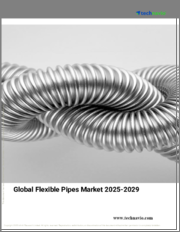
|
시장보고서
상품코드
1453895
플렉서블 파이프 시장 예측(-2030년) : 유형별, 원자재 유형별, 용도별, 지역별 세계 분석Flexible Pipes Market Forecasts to 2030 - Global Analysis By Type (Flow Lines, Jumpers, Risers, Fluid Transfer Lines and Other Types), Raw Material Type, Application, and By Geography |
||||||
Stratistics MRC에 따르면, 세계 플렉서블 파이프 시장은 2023년 12억 1,900만 달러에 달할 것으로 예상되며, 2030년에는 18억 8,190만 달러에 달할 것으로 예상되며, 예측 기간 동안 6.4%의 CAGR을 기록할 것으로 예상됩니다.
플렉서블 파이프는 해저의 움직임, 유체의 동적 흐름 등 다양한 조건에 대응하기 위해 구부러지거나 구부러질 수 있도록 특별히 설계된 파이프라인입니다. 폴리머, 금속, 보강재 등의 층으로 구성되어 내구성과 적응성이 뛰어납니다. 이러한 구조로 인해 설치 및 유지보수가 용이하고 가동 중지 시간과 운영 비용을 줄일 수 있습니다. 플렉서블 파이프는 심해 시추 및 해저 생산과 같이 기존의 경질 파이프라인이 실용적이지 않거나 손상되기 쉬운 가혹한 환경에서도 유체 수송의 무결성을 보장합니다.
인도브랜드에쿼티재단(IBEF)에 따르면, 인도의 재생에너지(천연가스) 발전량은 2020년에 1,270억 1,000만 유닛에 달할 것으로 예상했습니다.
확대되는 해저 인프라 투자
정부, 석유회사, 서비스 제공업체들은 해저 인프라 개발에 막대한 자금을 투입하여 해저 매장량에 대한 효율적이고 지속적인 접근을 위해 노력하고 있습니다. 이러한 투자는 에너지 자원, 특히 해양 석유 및 가스에 대한 수요 증가와 더 깊고 먼 곳에 있는 매장량 탐사에 대한 수요 증가에 기인합니다. 또한, 기술의 발전으로 인해 지금까지 접근이 불가능했던 심해 자원이 계속 발굴되고 있기 때문에 플렉서블 파이프에 대한 수요는 더욱 증가할 것으로 예상됩니다.
높은 초기 투자
플렉서블 파이프는 특수한 재료로 만들어지는 경우가 많고, 고도의 제조 공정이 필요하기 때문에 기존 경질 파이프에 비해 제조 비용이 더 많이 듭니다. 또한, 플렉서블 파이프의 설치에는 특수 장비, 숙련된 인력, 엔지니어링 전문 지식이 필요할 수 있으며, 이는 초기 투자비용을 더욱 증가시킵니다. 이러한 초기 비용은 시장 성장을 가로막는 장벽이 될 수 있습니다.
기술의 발전
재료 과학, 제조 공정 및 설계 능력의 혁신은 내구성이 뛰어나고 다재다능하며 효율적인 플렉서블 파이프를 개발하는 데 기여하고 있습니다. 현재 진행 중인 연구 개발은 플렉서블 파이프의 설계를 개선하고 유지보수 필요성을 최소화하면서 성능과 수명을 향상시키는 데 초점을 맞추고 있습니다. 이를 위해 보강 구조, 씰링 메커니즘 및 연결 기술의 혁신을 통해 플렉서블 파이프 시스템의 신뢰성과 효율성을 더욱 향상시키고 있습니다.
표준화 부족
표준화된 테스트 및 품질 보증 절차의 부재는 이 문제를 더욱 복잡하게 만듭니다. 표준화 된 사양이 없으면 플렉서블 파이프의 설계, 재료 및 성능 특성이 다양 할 수 있습니다. 이러한 일관성 부족은 구매자가 제품을 효과적으로 비교하고 평가하는 것을 어렵게 만듭니다. 또한, 업계 전반의 표준이 없기 때문에 플렉서블 파이프 분야의 기술 혁신과 연구를 방해하고 있습니다.
COVID-19의 영향
COVID-19는 주로 세계 공급망 혼란, 프로젝트 지연, 석유 및 가스 제품에 대한 수요 감소로 인해 유연성 파이프 시장에 큰 악영향을 미치고 있습니다. 봉쇄, 여행 제한, 노동력 부족으로 인한 공급망 혼란은 연성 파이프 제조에 필요한 원자재 및 부품 조달 지연으로 이어졌습니다. 또한, 수요 감소와 공급 과잉으로 인한 유가 하락은 플렉서블 파이프가 일반적으로 사용되는 해양 석유 및 가스 프로젝트에 대한 투자를 더욱 감소시키고 있습니다.
예측 기간 동안 점퍼 분야가 가장 큰 분야가 될 것으로 예상
점퍼 분야는 해양 석유 및 가스 사업에서 크리스마스 트리, 매니폴드, 플로우 라인과 같은 다양한 해저 구성요소 간의 연결을 용이하게 하는 데 중요한 역할을 하기 때문에 가장 큰 점유율을 차지할 것으로 추정됩니다. 이 커넥터는 다른 해저 장비에 빠르고 안정적으로 장착할 수 있게 해줍니다. 또한, 해저 지형의 변화, 열팽창, 장비 설치 및 제거로 인한 움직임에 유연하게 대응할 수 있어 이 부문의 성장을 점진적으로 촉진하고 있습니다.
폴리불화비닐리덴 부문은 예측 기간 동안 가장 높은 CAGR을 기록할 것으로 예상
폴리 비닐 리덴 플루오르 화 비닐 리덴 부문은이 열가소성 폴리머의 고유 한 특성과 용도가 산업의 큰 부분을 차지하기 때문에 예측 기간 동안 가장 높은 CAGR을 보일 것으로 예상되며, PVDF 기반 플렉서블 파이프는 다양한 화학제품 및 용매에 대한 내성이 있기 때문에 탄화수소 및 화학제품과 같은 부식성 유체 수송에 적합합니다. 또한, 유연하고 설치가 용이하여 심해 및 열악한 환경과 같은 가혹한 해양 조건에서 효율적으로 배치할 수 있어 이 부문의 성장을 촉진하고 있습니다.
가장 큰 점유율을 차지하는 지역
아시아태평양은 해양 석유 및 가스 활동 확대, 에너지 수요 증가, 해저 인프라 개발 투자 증가로 인해 예측 기간 동안 가장 큰 시장 점유율을 차지했습니다. 일본, 중국, 인도와 같은 국가들이 이 지역의 시장 성장에 크게 기여하고 있습니다. 또한, 이 지역의 광활한 해안선과 광범위한 해양 매장량은 얕은 바다와 심해 프로젝트에 플렉서블 파이프를 배치할 수 있는 풍부한 기회를 제공하여 아시아태평양의 플렉서블 파이프에 대한 수요를 더욱 강화하고 있습니다.
CAGR이 가장 높은 지역:
유럽은 예측 기간 동안 가장 높은 CAGR을 기록할 것으로 예상됩니다. 유럽은 성숙한 해양 석유 및 가스 산업을 자랑하며 북해 및 기타 해양 분지에서 오랜 기간 동안 탐사 및 생산의 역사를 가지고 있습니다. 플렉서블 파이프는 거친 바다, 극한의 온도, 부식성 환경 등 이 지역에 널리 퍼져있는 가혹한 조건을 견딜 수 있기 때문에 이러한 사업에서 널리 사용되고 있습니다. 또한, 엄격한 안전 및 환경 기준을 포함한 유럽의 강력한 규제 프레임워크는 이 지역에 배치된 플렉서블 파이프 시스템의 품질과 신뢰성을 보장합니다.
무료 커스터마이징 서비스
이 보고서를 구독하는 고객은 다음과 같은 무료 맞춤화 옵션 중 하나를 사용할 수 있습니다:
- 기업 개요
- 추가 시장 기업의 종합적인 프로파일링(최대 3개사까지)
- 주요 기업 SWOT 분석(최대 3개사)
- 지역 세분화
- 고객의 관심에 따른 주요 국가별 시장 추정치, 예측, CAGR(주: 타당성 검토에 따른)
- 경쟁사 벤치마킹
- 제품 포트폴리오, 지리적 입지, 전략적 제휴를 기반으로 한 주요 기업 벤치마킹
목차
제1장 주요 요약
제2장 서문
- 개요
- 이해관계자
- 조사 범위
- 조사 방법
- 데이터 마이닝
- 데이터 분석
- 데이터 검증
- 조사 접근법
- 조사 소스
- 1차 조사 소스
- 2차 조사 소스
- 가정
제3장 시장 동향 분석
- 성장 촉진요인
- 성장 억제요인
- 기회
- 위협
- 용도 분석
- 신흥 시장
- 신종 코로나바이러스 감염증(COVID-19)의 영향
제4장 Porter's Five Forces 분석
- 공급 기업의 교섭력
- 구매자의 교섭력
- 대체품의 위협
- 신규 참여업체의 위협
- 경쟁 기업 간의 경쟁 관계
제5장 세계의 플렉서블 파이프 시장 : 유형별
- 플로우 라인
- 점퍼
- 라이저
- 유체 이송 라인
- 기타
제6장 세계의 플렉서블 파이프 시장 : 원재료 유형별
- 폴리아미드
- 폴리비닐리덴플루오라이드
- 고밀도 폴리에틸렌
- 기타
제7장 세계의 플렉서블 파이프 시장 : 용도별
- 오프쇼어
- 온쇼어
- 기타
제8장 세계의 플렉서블 파이프 시장 : 지역별
- 북미
- 미국
- 캐나다
- 멕시코
- 유럽
- 독일
- 영국
- 이탈리아
- 프랑스
- 스페인
- 기타 유럽
- 아시아태평양
- 일본
- 중국
- 인도
- 호주
- 뉴질랜드
- 한국
- 기타 아시아태평양
- 남미
- 아르헨티나
- 브라질
- 칠레
- 기타 남미
- 중동 및 아프리카
- 사우디아라비아
- 아랍에미리트
- 카타르
- 남아프리카공화국
- 기타 중동 및 아프리카
제9장 주요 발전
- 계약, 파트너십, 협업, 합작투자
- 인수와 합병
- 신제품 발매
- 사업 확대
- 기타 주요 전략
제10장 기업 개요
- TechnipFMC PLC
- GE Oil & Gas Corporation
- National Oilwell Varco(NOV)
- SoulForce
- The Prysmian Group
- Magma Global Ltd
- Shawcor Ltd
- Airborne Oil & Gas BV
- ContiTech AG
- Flexsteel Pipeline Technologies Inc.
- Chevron Phillips Chemical Company LLC
According to Stratistics MRC, the Global Flexible Pipes Market is accounted for $1,219.0 million in 2023 and is expected to reach $1,881.9 million by 2030 growing at a CAGR of 6.4% during the forecast period. Flexible pipes are specially designed pipelines capable of bending and flexing to accommodate various conditions, such as seabed movements or dynamic fluid flows. Composed of layers including polymers, metals, and reinforcement materials, they offer durability and adaptability. Their construction allows for easy installation and maintenance, reducing downtime and operational costs. Flexible pipes ensure fluid transportation integrity in challenging environments, such as deep-sea drilling or subsea production, where traditional rigid pipelines may be impractical or vulnerable to damage.
According to the India Brand Equity Foundation (IBEF), power generation from renewable energy sources (natural gas) in India reached 127.01 billion units in FY20.
Market Dynamics:
Driver:
Growing subsea infrastructure investments
Governments, oil companies, and service providers are allocating substantial funds to develop subsea infrastructure to access these reserves efficiently and sustainably. These investments stem from the increasing demand for energy resources, particularly offshore oil and gas, and the exploration of deeper and more remote reserves. Moreover, as technological advancements continue to unlock previously inaccessible resources in deeper waters, the demand for flexible pipes is expected to rise further.
Restraint:
High initial investment
Flexible pipes are often made from specialized materials and require advanced manufacturing processes, which contributes to higher production costs compared to traditional rigid pipes. Additionally, the installation of flexible pipes may require specialized equipment, skilled labor, and engineering expertise, which further adds to the initial investment required. The upfront cost can be perceived as a barrier hindering market growth.
Opportunity:
Technological advancements
Innovations in materials science, manufacturing processes, and design capabilities contribute to the development of more durable, versatile, and efficient flexible pipe solutions. Ongoing research and development efforts focus on improving the design of flexible pipes to enhance their performance and longevity while minimizing maintenance requirements. Thus, this includes innovations in reinforcement structures, sealing mechanisms, and connection technologies, further enhancing the reliability and efficiency of flexible pipe systems.
Threat:
Lack of standardization
The absence of standardized testing and quality assurance procedures further compounds the issue. Without standardized specifications, there can be variations in the design, materials, and performance characteristics of flexible pipes. This lack of consistency makes it difficult for buyers to compare and evaluate products effectively. Additionally, the absence of industry-wide standards hampers innovation and research in the field of flexible pipes.
Covid-19 Impact
The COVID-19 pandemic has had significant negative impacts on the flexible pipe market, primarily due to disruptions in global supply chains, project delays, and decreased demand for oil and gas products. Supply chain disruptions, stemming from lockdowns, travel restrictions, and workforce shortages, have led to delays in the procurement of raw materials and components necessary for manufacturing flexible pipes. Moreover, the decline in oil prices resulting from reduced demand and oversupply has further dampened investment in offshore oil and gas projects, where flexible pipes are commonly used.
The jumpers segment is expected to be the largest during the forecast period
The jumpers segment is estimated to hold the largest share due to its crucial role in facilitating the connection between various subsea components, such as Christmas trees, manifolds, and flowlines, in offshore oil and gas operations. These connectors allow for quick and secure attachment to other subsea equipment. Additionally, they provide flexibility to accommodate movements caused by seabed topography changes, thermal expansion, and equipment installation or removal, thereby gradually propelling this segment's growth.
The polyvinylidene fluoride segment is expected to have the highest CAGR during the forecast period
The polyvinylidene fluoride segment is anticipated to have highest CAGR during the forecast period due to a significant portion of the industry driven by the unique properties and applications of this thermoplastic polymer. PVDF-based flexible pipes are well-suited for conveying corrosive fluids, such as hydrocarbons and chemicals, due to their resistance to a wide range of chemicals and solvents. Moreover, they offer flexibility and ease of installation, enabling efficient deployment in challenging offshore conditions, including deepwater and harsh environments, which boosts this segment's expansion.
Region with largest share:
Asia Pacific commanded the largest market share during the extrapolated period owing to the region's expanding offshore oil and gas activities, growing energy demand, and increasing investments in subsea infrastructure development. Countries such as Japan, China and India are key contributors to the market's growth in this region. Moreover, the region's vast coastline and extensive offshore reserves present abundant opportunities for flexible pipe deployment in both shallow and deepwater projects, further bolstering the demand for flexible pipes in the Asia Pacific region.
Region with highest CAGR:
Europe is expected to witness highest CAGR over the projection period. Europe boasts a mature offshore oil and gas industry, with a long history of exploration and production in the North Sea and other offshore basins. Flexible pipes are widely utilized in these operations due to their ability to withstand the harsh conditions prevalent in the region, including rough seas, extreme temperatures, and corrosive environments. Furthermore, Europe's strong regulatory framework, including stringent safety and environmental standards, ensures the quality and reliability of flexible pipe systems deployed in the region.
Key players in the market
Some of the key players in the Flexible Pipes Market include TechnipFMC PLC, GE Oil & Gas Corporation, National Oilwell Varco (NOV), SoulForce, The Prysmian Group, Magma Global Ltd, Shawcor Ltd, Airborne Oil & Gas BV, ContiTech AG, Flexsteel Pipeline Technologies Inc. and Chevron Phillips Chemical Company LLC.
Key Developments:
In November 2023, Element Materials Technology announced the renewal of its strategic partnership with Magma Global (Portsmouth, U.K.), a TechnipFMC company that develops composite pipes to simplify subsea oil and gas architecture.
In August 2023, Technology Company Continental has launched its first private 5G network among European manufacturing sites at its display solutions plant in Brandys nad Labem.
Types Covered:
- Flow Lines
- Jumpers
- Risers
- Fluid Transfer Lines
- Other Types
Raw Material Types Covered:
- Polyamides
- Polyvinylidene Fluoride
- High-Density Polyethylene
- Other Raw Material Types
Applications Covered:
- Offshore
- Onshore
- Other Applications
Regions Covered:
- North America
- US
- Canada
- Mexico
- Europe
- Germany
- UK
- Italy
- France
- Spain
- Rest of Europe
- Asia Pacific
- Japan
- China
- India
- Australia
- New Zealand
- South Korea
- Rest of Asia Pacific
- South America
- Argentina
- Brazil
- Chile
- Rest of South America
- Middle East & Africa
- Saudi Arabia
- UAE
- Qatar
- South Africa
- Rest of Middle East & Africa
What our report offers:
- Market share assessments for the regional and country-level segments
- Strategic recommendations for the new entrants
- Covers Market data for the years 2021, 2022, 2023, 2026, and 2030
- Market Trends (Drivers, Constraints, Opportunities, Threats, Challenges, Investment Opportunities, and recommendations)
- Strategic recommendations in key business segments based on the market estimations
- Competitive landscaping mapping the key common trends
- Company profiling with detailed strategies, financials, and recent developments
- Supply chain trends mapping the latest technological advancements
Free Customization Offerings:
All the customers of this report will be entitled to receive one of the following free customization options:
- Company Profiling
- Comprehensive profiling of additional market players (up to 3)
- SWOT Analysis of key players (up to 3)
- Regional Segmentation
- Market estimations, Forecasts and CAGR of any prominent country as per the client's interest (Note: Depends on feasibility check)
- Competitive Benchmarking
- Benchmarking of key players based on product portfolio, geographical presence, and strategic alliances
Table of Contents
1 Executive Summary
2 Preface
- 2.1 Abstract
- 2.2 Stake Holders
- 2.3 Research Scope
- 2.4 Research Methodology
- 2.4.1 Data Mining
- 2.4.2 Data Analysis
- 2.4.3 Data Validation
- 2.4.4 Research Approach
- 2.5 Research Sources
- 2.5.1 Primary Research Sources
- 2.5.2 Secondary Research Sources
- 2.5.3 Assumptions
3 Market Trend Analysis
- 3.1 Introduction
- 3.2 Drivers
- 3.3 Restraints
- 3.4 Opportunities
- 3.5 Threats
- 3.6 Application Analysis
- 3.7 Emerging Markets
- 3.8 Impact of Covid-19
4 Porters Five Force Analysis
- 4.1 Bargaining power of suppliers
- 4.2 Bargaining power of buyers
- 4.3 Threat of substitutes
- 4.4 Threat of new entrants
- 4.5 Competitive rivalry
5 Global Flexible Pipes Market, By Type
- 5.1 Introduction
- 5.2 Flow Lines
- 5.3 Jumpers
- 5.4 Risers
- 5.5 Fluid Transfer Lines
- 5.6 Other Types
6 Global Flexible Pipes Market, By Raw Material Type
- 6.1 Introduction
- 6.2 Polyamides
- 6.3 Polyvinylidene Fluoride
- 6.4 High-Density Polyethylene
- 6.5 Other Raw Material Types
7 Global Flexible Pipes Market, By Application
- 7.1 Introduction
- 7.2 Offshore
- 7.3 Onshore
- 7.4 Other Applications
8 Global Flexible Pipes Market, By Geography
- 8.1 Introduction
- 8.2 North America
- 8.2.1 US
- 8.2.2 Canada
- 8.2.3 Mexico
- 8.3 Europe
- 8.3.1 Germany
- 8.3.2 UK
- 8.3.3 Italy
- 8.3.4 France
- 8.3.5 Spain
- 8.3.6 Rest of Europe
- 8.4 Asia Pacific
- 8.4.1 Japan
- 8.4.2 China
- 8.4.3 India
- 8.4.4 Australia
- 8.4.5 New Zealand
- 8.4.6 South Korea
- 8.4.7 Rest of Asia Pacific
- 8.5 South America
- 8.5.1 Argentina
- 8.5.2 Brazil
- 8.5.3 Chile
- 8.5.4 Rest of South America
- 8.6 Middle East & Africa
- 8.6.1 Saudi Arabia
- 8.6.2 UAE
- 8.6.3 Qatar
- 8.6.4 South Africa
- 8.6.5 Rest of Middle East & Africa
9 Key Developments
- 9.1 Agreements, Partnerships, Collaborations and Joint Ventures
- 9.2 Acquisitions & Mergers
- 9.3 New Product Launch
- 9.4 Expansions
- 9.5 Other Key Strategies
10 Company Profiling
- 10.1 TechnipFMC PLC
- 10.2 GE Oil & Gas Corporation
- 10.3 National Oilwell Varco (NOV)
- 10.4 SoulForce
- 10.5 The Prysmian Group
- 10.6 Magma Global Ltd
- 10.7 Shawcor Ltd
- 10.8 Airborne Oil & Gas BV
- 10.9 ContiTech AG
- 10.10 Flexsteel Pipeline Technologies Inc.
- 10.11 Chevron Phillips Chemical Company LLC














